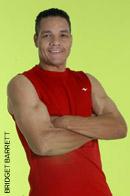 Since losing 185 pounds during and after his time on NBC’s hit weight-loss reality show, Pete Thomas of Ypsilanti, Michigan, has turned to educating others about the life-changing—even lifesaving—process of losing massive amounts of weight. This maverick of “extreme weight loss” has developed his own system specifically for people who need to lose 50 pounds or more.
Since losing 185 pounds during and after his time on NBC’s hit weight-loss reality show, Pete Thomas of Ypsilanti, Michigan, has turned to educating others about the life-changing—even lifesaving—process of losing massive amounts of weight. This maverick of “extreme weight loss” has developed his own system specifically for people who need to lose 50 pounds or more.
How did it feel to be back on the set of The Biggest Loser for this season’s preview episode?
It was almost like going back to the genesis or the birthplace of where you really got a handle on your life, and for me it was where I really got a handle on losing all that weight.
How have you kept the weight off?
I’ve developed my own program that I use to help me keep on track, called “Lose It Fast, Lose It Forever.” I watch what I eat based on my BMR, my basal metabolic rate, and I exercise four to six hours a week.
Your BMR is the amount of energy (calories) your body needs to function—the number of calories your body burns per day to maintain your current weight. You’ve got to know your BMR. Professional testing is best [find testing centers in your area at www.newleaffitness.com; or calculate it yourself online at www.caloriesperhour.com/index_burn.html].
My exercise is a combination of cardio and resistance training. I go on an hour or hour-and-a-half jog, two or three times a week, and I go to the gym twice a week to do resistance training.
And I’ve taken what I’ve learned and I’m able to give it back to others. That’s been a big key to my own success.
What are some of the things you teach?
There’s the common belief that we need to lose weight slowly. I believe that if someone wants to lose weight quickly, they can, and if they’re dedicated I can teach them how to maintain it.
Often you’ll also hear that weight loss is about portion size. Portion size is not as important as the number of calories in the portion. For example, a six-ounce cup of yogurt can vary from 60 calories to 170 calories. You’ve got to understand basal metabolic rate, and you’ve got to learn how to revise what you eat.
So would you call yourself an expert in extreme weight loss?
Yes, that would be it. I specialize in weight loss for obese people. I want to provide hope to those people who are severely overweight.
You mentioned that you work out four to six hours a week. How do you find the time?
The real key is having a variety of options. I’ve got a sticky note in my calendar that says “exercise opportunities”—for instance, I know that on Thursday evening, guys my age get together at the local gym. So I know that if I can’t work out in the morning, tomorrow night I can absolutely make that. So there’s what I have planned, but then there’s also all these other contingencies, because I owe myself this time—the time to exercise.
What can you say to African Americans about the psychological element of the struggle to lose weight?
Your past does not determine your future. Especially with African Americans, with the struggles we’ve overcome. You’ve got to get educated and you’ve got to get people around you who are a support system. You’ve got to declare war on obesity.
I had to evaluate how I became this big. I was raised by a mother who was schizophrenic. We lived in 13 different cities by the time I was 13 years old. I was in and out of foster care in the midst of all that. It was this vicious cycle; by never being settled in any one place, I never learned the proper way to eat. It really caused my body to go awry. I never understood what “full” was. And so that’s what caused my long-term problems with obesity. I had to forgive my mother. After that I had to educate myself. I had to do research, and I had to talk to different doctors and people successful at losing weight. When I started gaining weight, I always believed that some way or another I was going to lose the weight. With multiple diets, I did, but I always gained it back. But I never stopped believing.
So belief really helped you through from the start?
I believe that God did not want me to live this way. I was like, “Okay God, just show me what to do.” I want to have this problem solved and go on with my life. But it was one of those things where I really had to know it like the back of my hand, and then an outgrowth of that is being able to teach it to others.
For more on Pete Thomas, visit winningman.com.
Winning at Losing
Pete Thomas, the surprise success story of 2005’s The Biggest Loser has made it his mission to help others lose massive amounts of weight.






Comments
Comments